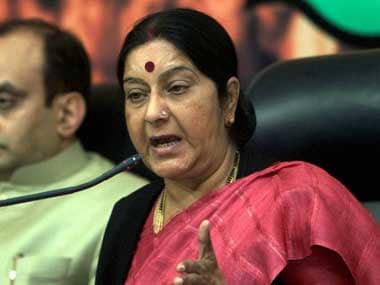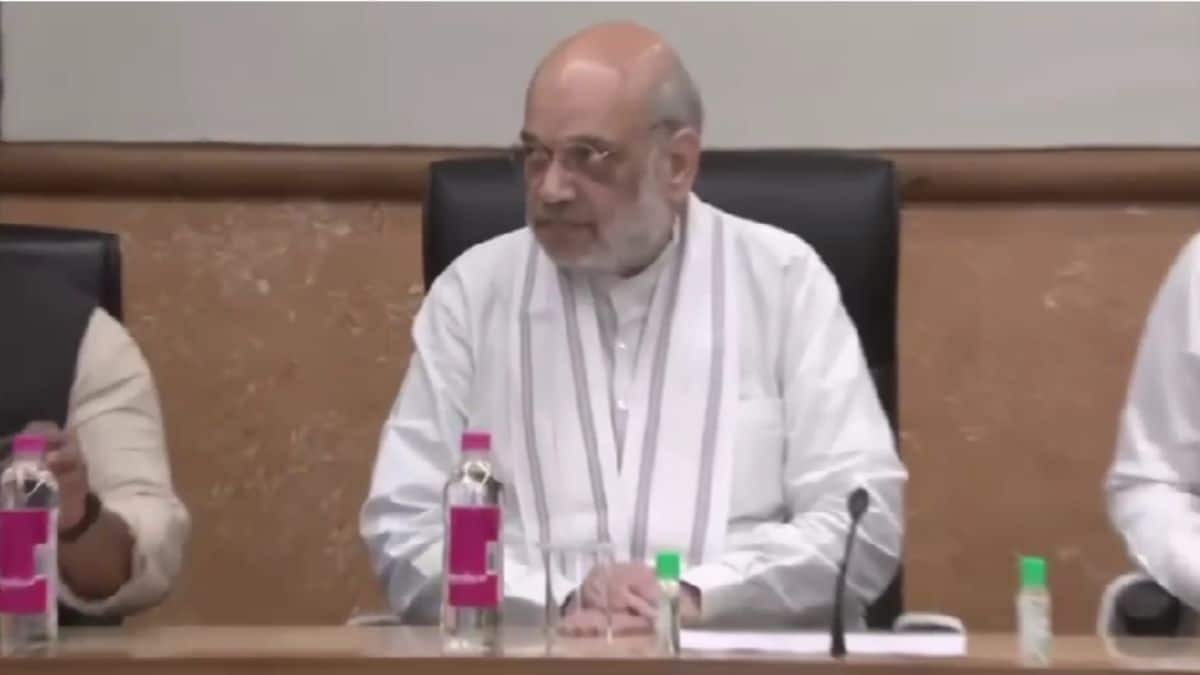On 6 December, US president Donald Trump, in an unprecedented policy move, recognised Jerusalem as Israel’s capital and announced that the American embassy will soon be moved out of Tel Aviv into the sharply contested holy city. This is an affirmative validation of the decades-old Israeli claim on west Jerusalem and a tacit attestation to its claim on East Jerusalem, as opposed to the corresponding claim by Palestine. These counter-claims remain key flashpoints in the limping dialogue process between the two parties. [caption id=“attachment_4214813” align=“alignleft” width=“380”]  File image of External Affairs Minister Sushma Swaraj. PTI[/caption] Make no mistake: Trump’s announcement is a decisive turnaround in longstanding US policy on the Israel-Palestine conflict, and severely negates Washington’s credibility as a mediator in the fifty-year long dispute. It is a radical move in itself that promises to come along with an entire spectrum of ramifications for the regional political and security landscape. In an immediate follow-up to Trump’s announcement, the spokesperson for India’s Ministry of External Affairs (MEA) gave the following statement: “India’s position on Palestine is independent and consistent. It is shaped by our views and interests, and not determined by any third country.” This highly-calibrated and diplomatically-measured statement encapsulates India’s complex balancing act with respect to not just Israel-Palestine, but also the US and the entire West Asian region extending to the Gulf. Tilt or balance? Taken at face value, the MEA’s position reflects New Delhi’s ostensible neutrality over the era-defining Israel-Palestine issue. This neutrality is hardly new, and goes back to the early 1990s when India opened diplomatic channels with Israel while also keeping bilateral engagement alive and well with the Palestinian leadership. This balancing act has continued under the government of Prime Minister Narendra Modi, albeit within a slightly different template. Since Modi came to power in 2014, New Delhi has moved visibly closer to Israel. It has initiated fresh diplomatic engagement with the Netanyahu government in the critical sectors of defence, agriculture, IT, and education. Modi’s lavish visit to Israel in July 2017 and his decision to not visit the occupied Palestinian territories, in many ways, reflect India’s subtle tilt towards the former. In many ways, even the BJP’s right-wing Hindutva nationalism falls fit with Zionist nationalism insofar as building an anti-Islamic alliance is concerned. Another pivotal driver behind this growing intimacy is India’s tacit expectation of deriving the US’ goodwill, a point that gained greater relevance with the coming of staunchly pro-Israel Trump. However, it might be too early to identify a clear diplomatic shift. In May, India also hosted Palestinian president Mahmoud Abbas on a four-day visit. The MEA called him an “important guest.” During the visit, Modi reaffirmed India’s “unwavering” support of the “Palestinian cause” and expressed hope towards the “realisation of a sovereign, independent, united and viable Palestine, co-existing peacefully with Israel.” Several Memorandums of Understanding (MoUs) were signed, entailing India’s support in building infrastructure and capacity in Palestine. The Modi government also appears to be placing itself as an active supporter of the tottering peace process, unlike the previous UPA administration that remained largely passive in the region’s political disputes. To this end, maintaining amicable relations with both disputing parties remains imperative. Despite this median posturing, fact remains that New Delhi’s engagement with Israel is much deeper and broader than with Palestine, wherein the promises of material support made by the Modi government to the latter remain unrealised as yet. For example, the India-Palestinian Digital Learning and Innovation Centre that Foreign Minister Sushma Swaraj inaugurated during her January 2016 visit to Ramallah still awaits completion. Moreover, a large section of the Palestinian leadership feels that the Modi government has significantly scaled down support to their cause, in addition to the visible congruence of the Hindutva and Zionist agendas. But, India’s statement in light of the US decision to recognise Jerusalem as the Israeli capital proves that New Delhi can afford to maintain a non-productive relationship with Palestine but never really openly subvert it. New Delhi’s logic of supporting the Palestinian cause The MEA’s statement on the US decision on Jerusalem is a blunt affirmation that India is not obligated to either support or condemn the Trump administration’s startling move. In doing so, New Delhi seems to be relaying a carefully-framed message to both Washington and the powerful oil economies of the Gulf, a message that is tailored to suit its own national interests. First, India—like most other traditional US allies—remains apprehensive of the Trump cohort’s errant but assertive diplomatic dispensations. Despite doubts over the feasibility of Trump’s contentious campaign promises before he won the White House, the US president has proven that he is, after all, not ‘all talk, no action.’ So far, he has successfully managed to install selective immigration blockades, pull out of the Paris Climate Accord, begin testing prototypes of the border wall with Mexico, push his promised tax reforms through the Senate, started their attempt to repeal net neutrality, and finally, recognise Jerusalem as Israel’s capital. All of this within his patent framework of unpredictability and recklessness. Although Trump has been generally amicable towards India, his unyielding character and unconventionally America-centric policy approach compels India to keep him in its good books, lest it ends up in a disadvantaged position. This fear has unraveled most in the domains of American H1B visas for Indian immigrants (which for now remains as it is) and India’s IPR laws that restrict free-flow of US investments. Both have played spoilers in the lukewarm Modi-Trump relationship. Thus, any hostile move from New Delhi could draw Trump’s ire to the end of Washington slamming the hammer on India on both issues. This, amongst others, is a key reason why India avoided deploring Trump on his Jerusalem decision, unlike many of its longtime allies in Europe and West Asia. It would even be fair to argue that New Delhi might have expressed concern, if not condemnation, at the move if it was anyone else in place of Trump: Someone more diplomatic and predictable. The second driver is India’s growing closeness with the wealthy Gulf economies, almost all of which have openly condemned Trump’s decision to recognise Jerusalem as Israel’s capital. The Gulf Cooperation Council (GCC) countries—particularly Saudi Arabia, UAE, and Kuwait—are extremely crucial to India’s political, economic, and strategic interests. These countries remain, on the upward, the largest exporters of crude oil to India, thus forming the conclusive source of India’s long-term energy security interests. The Gulf countries also host the largest share of Indian immigrant workers, thus forming the biggest source of remittances. Moreover, under Modi, India has initiated greater strategic cooperation with these countries in the domains of counter-terrorism and infrastructural investments. Clearly, New Delhi expressing positive affirmation of Trump’s Jerusalem announcement would not have gone down well with India’s West Asian partners. That would have been gravely disastrous for India’s interests in the region. This is even more so because of the stark quantitative difference between the India-Israel and the India-Gulf trade channels: While trade between India and Israel is valued at $4 billion as of 2017, India’s trade with Saudi Arabia alone stood at $26.6 billion in the 2015-16 period. This is a massive gap that compels India, within rational boundaries of long-term viability, to value the Gulf more than Israel. Consequences of India’s position One could argue that India’s neutral posturing on the Jerusalem decision has the potential to isolate Israel, and by extrapolation, the US. After all, the MEA’s statement could be read as a solid rejection of Washington’s position, put against Israel’s calls to all other countries to follow suit. However, it is too early to say so. In this particular case, perhaps unlike others, India’s neutral stance is what it is: Neutral. In other words, India refused to condemn the US move while also not standing by it. Three distinct consequences could follow from this: First, Washington reads this as a hostile stance, in which case, it could tighten the screws on India on the H1B visa and IPR issues; second, the entire matter remains out of the India-US bilateral, mostly because India exercised its sovereign and perfectly acceptable right to operate along its own exclusive interests; and third, US reads this as tacit support for its position. “Rather than losing losing US goodwill, India will actually gain goodwill because of its response: Much like the Indian refusal to condemn Russia’s annexation of Crimea was taken positively in Moscow as a sign of support. At the same time, the MEA statement subtly but clearly says that Indian interests, investments, and domestic political consequences in the region are quite different from those of the US,” argues Abhijit Iyer-Mitra, a New Delhi-based strategic analyst specialising in West Asian affairs. In all, India has shown impressive diplomatic tact in dealing with this hugely polarising issue. By not moving towards an extreme position, New Delhi has successfully retained the promising space for broad-spectrum engagement with not just the Trump administration, but also the whole of West Asia, from Riyadh to Tel Aviv (or Jerusalem?).
On 6 December, US president Donald Trump, in an unprecedented policy move, recognised Jerusalem as Israel’s capital and announced that the American embassy will soon be moved out of Tel Aviv into the sharply contested holy city. This is an affirmative validation of the decades-old Israeli claim on west Jerusalem and a tacit attestation to its claim on East Jerusalem, as opposed to the corresponding claim by Palestine. These counter-claims remain key flashpoints in the limping dialogue process between the two parties.
Advertisement
End of Article


)

)
)
)
)
)
)
)
)



